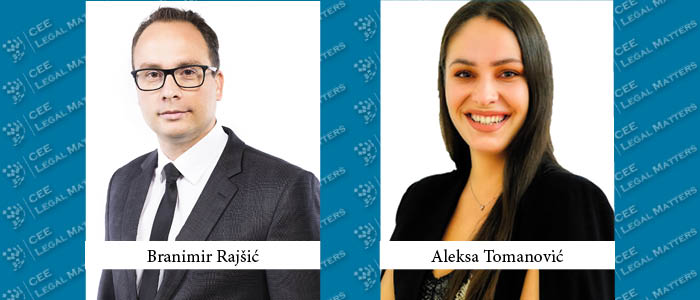The new Law on Electronic Media (“the Law“) has been published in the Official Gazette of the Republic of Serbia, no. 92/2023, and came into effect on November 4, 2023.
The primary objective of enacting the Law is to implement the European Union Audiovisual and Media Services Directive (“the Directive“) by introducing new obligations for providers of media services, especially on-demand media service providers. Additionally, the Law for the first time regulates video content exchange platforms, directly influenced by the Directive in domestic legislation.
The Law introduces several innovations concerning the selection of members of the Regulatory Body for Electronic Media (“Regulatory Body“) and obligations related to program placement by operators, among numerous other changes.
Below is a brief overview of the most significant innovations.
1. New Obligations for On-Demand Media Service Providers
Given that on-demand media service providers have increasingly taken precedence over traditional media in recent years, aiming to become the dominant model for consuming media content, and considering that, under previous legislation, they were subject to significantly more lenient rules regarding advertising, protection of minors, and promotion of European audiovisual works, the Law introduces new quotas for on-demand media service providers and other significant changes, such as those related to the protection of minors.
According to the Law, on-demand media service providers must ensure that at least 30% of the content in their catalogs during each calendar year consists of European audiovisual works. The quota is calculated based on the number of individual works in the catalog, considering one season of a TV series as one work. Furthermore, the Law explicitly stipulates that at least half of these works must be Serbian audiovisual works.
Additionally, on-demand media service providers are required to ensure the prominent visibility of European works in their catalogs by presenting them in an attractive and accessible manner, especially through a dedicated section for European works, search capabilities, promoting European audiovisual works, and content recommendations to users.
The stated obligations refer to media service providers under the jurisdiction of the RS, i.e., to a media service provider that is established in the RS or not established in the RS but uses a terrestrial satellite transmission station located in the RS or uses satellite capacities that belong to the RS.
Moreover, the Law introduces other significant changes, such as the elimination of distinct rules for linear and on-demand media concerning the protection of minors and the temporary restriction of the reception and retransmission of media services from foreign countries. The same conditions are now prescribed regardless of whether it is a linear or on-demand media service.
2. Regulation of Video Content Exchange Platforms
The Law marks the first time that media regulation covers providers of video content exchange platforms (YouTube, Instagram, TikTok, etc.), directly implementing the Directive.
Services provided by video content exchange platforms are defined as information society services under the Electronic Commerce Act, whose main purpose is to make available to the public, for informational, entertainment, or educational purposes, program content, or user-generated video content, or both, through an electronic communication network, for which the platform provider is not editorially responsible but organizes such content, particularly through the presentation, labeling, and determining the order, using automated means or algorithms, among other methods.
Unlike linear and on-demand media services, which are responsible for producing, selecting, and controlling content and its organization, video content exchange platforms have organizational responsibility only for the content they distribute. They must take specific measures to protect users by organizing content, even though, in most cases, this is done automatically through algorithms.
Video content exchange platforms are also responsible for the advertising messages they offer and edit within their services, following the provisions of the advertising law.
Importantly, providers of video content exchange platforms are obliged to take appropriate measures to prevent harmful content that may harm minors, and encourage violence, hatred, or crimes of public incitement to commit terrorist acts, child pornography, or racial or other discrimination.
The Law does not prescribe specific appropriate measures that these platforms must take to be relieved of liability for unauthorized content. The Regulatory Body is authorized to determine them more precisely, taking into account the nature of the content, potential harm, the characteristics and categories of persons to be protected, including providers of video content exchange platform services, users who generated video content, and public interest.
It is noteworthy that the Law applies only to providers of video content exchange platform services with headquarters in Serbia (or when the parent company or subsidiary with headquarters in RS, i.e., when part of a group of companies, a company from that group has headquarters in RS). Given that none of the most popular platforms in Serbia is under our jurisdiction, the scope of these provisions is questionable.
3. Media Pluralism and Transparency of Media Ownership
The Law defines the concept of media pluralism, stipulating that it entails various forms of establishing media service providers, diversity of content in terms of equal and balanced expression of political opinions, and diversity of program content within the type and character of the media service provider’s programs.
Control and transparency regarding media ownership are also envisaged, with measures prescribed to achieve media pluralism.
Specifically, the Law introduces an obligation to report any changes in the ownership structure of the share capital of media service providers to obtain the consent of the Regulatory Body for such changes.
In the event of non-compliance with this obligation, or if a media service provider makes a change in the ownership structure without prior approval from the Regulatory Body, a fine for a misdemeanor will be imposed ranging from 500,000.00 dinars to 2,000,000.00 dinars.
4. Other Innovations
The Law introduces a new provision concerning the rights and duties of employees in the expert service of the Regulatory Body. It stipulates that general labor regulations apply to them instead of the previously valid provisions governing the rights and obligations of state officials.
Furthermore, the Law more comprehensively regulates the conditions that members of the Council of the Regulatory Body must meet. It is prescribed that members are selected from reputable experts in fields relevant to the tasks within the competence of the body, individuals with public standing who have advocated for freedom of expression, free flow of information, human rights, etc. Additionally, the Law explicitly defines who is considered an expert in fields relevant to the tasks of the Regulatory Body.
As before, members of the Council of the Regulatory Body are elected by the National Assembly, based on proposals from authorized nominators. A novelty is that, among others, the Ombudsman, the Commissioner for Equality, and the Commissioner for the Protection of Information of Public Importance and Personal Data, now have the authority and duty to propose members of the Council.
Moreover, the Law now directly, rather than through delegated authority to the Regulatory Body, specifies that the operator is obliged to position programs in its offer as follows: 1) the operator’s service channel with information about the operator’s content offer – position zero; 2) basic programs of public media services in their coverage area – positions immediately after zero; 3) all other TV media services in the operator’s offer – after positions from point 2, in the order determined by the operator.
An interesting point is that the Proposal of the Law included a provision stating that reality programming is considered inappropriate for all minors, i.e., individuals under 18 years of age, if it includes violence, indecent behavior, insult, or naked human bodies. It was also stipulated that reality programs are prohibited from showing severe violence, sexual relations, abuse of drugs, or hate speech, with the media service provider obligated to respect the dignity of the participants in reality programming and other rights, especially the prohibition of treating them in a discriminatory, inhuman, or demeaning manner. However, this provision is not included in the adopted text of the Law, and it is only stated that it will be the subject of a separate by-law.
This article is to be considered as exclusively informative, with no intention to provide legal advice. If you should need additional information, please contact us directly.
By Milan Petrovic, Managing Partner, and Danica Nikitovic, Junior Associate, PR Legal


